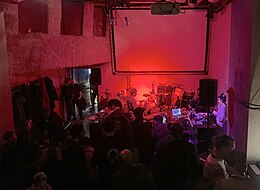Free improvisation or free music is improvised music without any general rules, instead following the intuition of its performers. The term can refer to both a technique—employed by any musician in any genre—and as a recognizable genre of experimental music in its own right.
Nicolas Collins is a composer of mostly electronic music, a sound artist and writer. He received his BA and MA from Wesleyan University, and his PhD from the University of East Anglia. Upon graduating from Wesleyan, he was a Watson Fellow.

The Berliner Festspiele in Berlin organise and stage a large number of independent festivals as well as exhibitions and individual events in the fields of music, theatre, performance, dance, literature and visual arts throughout the year. Events are held at the Haus der Berliner Festspiele, a pre-existing theatre devolved to that purpose in 2001, as well as at the Martin-Gropius-Bau and other venues.
Friedrich Goldmann was a German composer and conductor.
Since the 18th century Berlin has been an influential musical center in Germany and Europe. First as an important trading city in the Hanseatic League, then as the capital of the electorate of Brandenburg and the Prussian Kingdom, later on as one of the biggest cities in Germany it fostered an influential music culture that remains vital until today. Berlin can be regarded as the breeding ground for the powerful choir movement that played such an important role in the broad socialization of music in Germany during the 19th century.
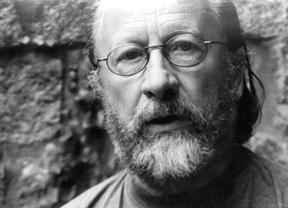
Georg Katzer was a German composer and teacher. The last master student of Hanns Eisler, he composed music in many genres, including works for the stage. Katzer was one of the pioneers of electronic new music in the German Democratic Republic and the founder of the first electronic-music studio in the GDR. He held leading positions in music organisations, first in the East, then in the united Germany, and received many awards, including the Art Prize of the German Democratic Republic, the National Prize of the German Democratic Republic, the Order of Merit of the Federal Republic of Germany, and the German Music Authors' Prize.
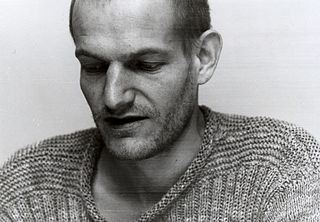
Wolfgang Mitterer is an Austrian composer and musician.

Iris ter Schiphorst is a German composer and musician.

Berlin is recognized as a world city of culture and creative industries. Numerous cultural institutions, many of which enjoy international reputation are representing the diverse heritage of the city. Many young people, cultural entrepreneurs and international artists continue to settle in the city. Berlin has established itself as a popular nightlife and entertainment center in Europe.
The Berlin Biennale is a contemporary art exhibition, which has been held at various locations in Berlin, Germany, every two to three years since 1998. The curator or curators choose the artists who will participate. After the event became established, annual themes were introduced. The Biennale is now underwritten by the German government through the Kulturstiftung des Bundes and is the second most important contemporary arts event in the country, after documenta. The Berlin Biennale was co-founded on 26 March 1996 by Klaus Biesenbach and a group of collectors as well as patrons of art. Biesenbach is also the founding director of KW Institute for Contemporary Art and currently serves as Director of MoMA PS1 and Chief Curator at Large at MoMA.
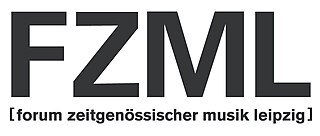
The Forum Zeitgenössischer Musik Leipzig [FZML](Forum of Contemporary Music Leipzig) is a non-profit organisation situated in Leipzig and an independent cultural organisation for the project-based communication of contemporary music.
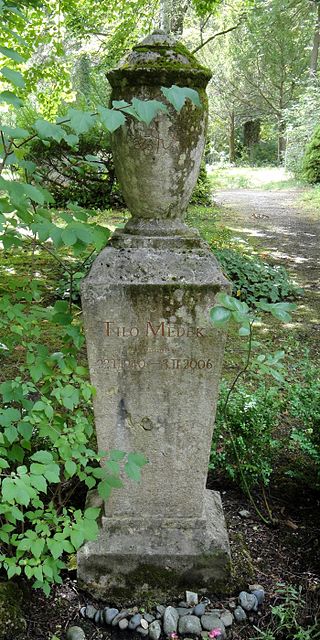
Tilo Medek, originally Müller-Medek, was a German classical composer, musicologist and music publisher. He grew up in East Germany, but was inspired by the Darmstädter Ferienkurse. He composed radio plays and incidental music. His setting of Lenin's Decree on Peace led to restrictions, and after he showed solidarity with the expatriated Wolf Biermann, he also had to move to the West, where he composed an opera Katharina Blum based on Heinrich Böll's novel, and worked in education. He received international awards from 1967 onwards.
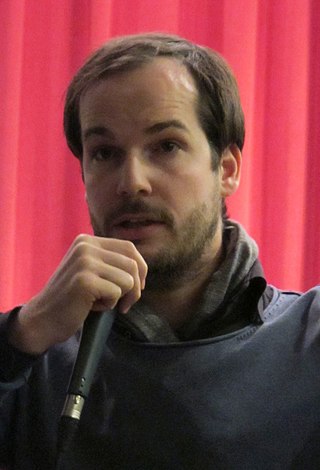
Max Czollek is a German writer, lyric-poet, stage performer and curator. He is a member of the "G13" authors' collective.
Fred K. Prieberg was a German musicologist. He was a pioneer in the field of history of music and musicians under the Nazi regime.
Ulrich Mosch is a German musicologist.
Thomas Christoph Heyde is a German composer, media artist and curator. He is chairman of the Forum Zeitgenössischer Musik Leipzig.
Volker Straebel is a German musicologist and composer and performer of experimental music.
Titus Engel is a Swiss conductor with a focus on both contemporary opera and Baroque opera in historically informed performance.
Nico Sauer is a German composer, performance artist and multimedia artist.
MaerzMusik is a festival of the Berliner Festspiele and has been held annually since March 2002 at the Haus der Berliner Festspiele and other venues. It is the successor festival to the Musik-Biennale Berlin and is considered one of the most important festivals for Neue Musik in Germany. The artistic director of MaerzMusik is Kamila Metwaly.


